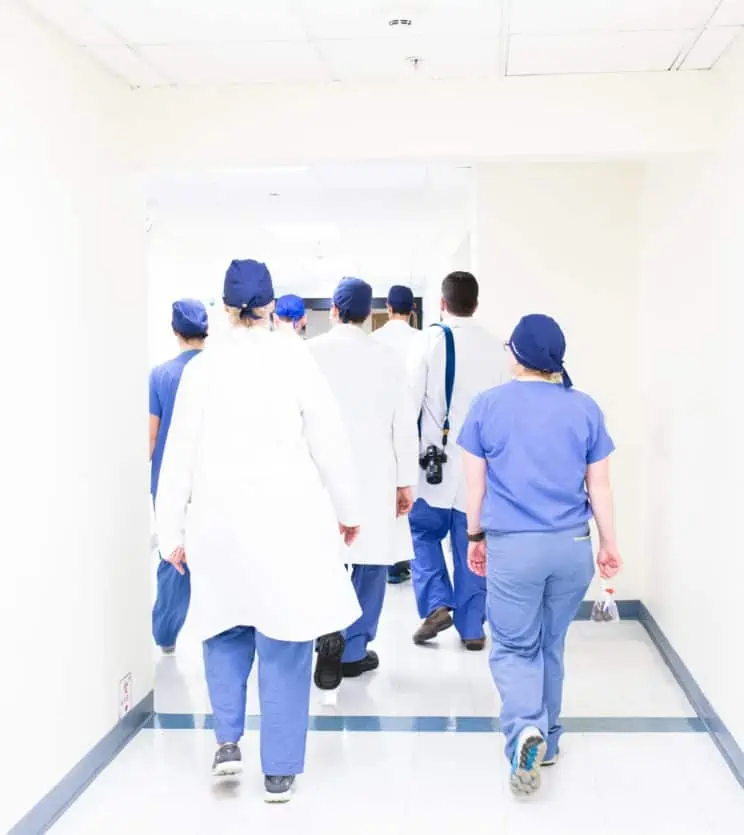Doctor On Call – What to Expect and How to Make the Most of it

There are two types of call for a doctor: in house call, and home call. The type of call also varies by department or specialty and depends on the PGY level your partner is. Here is what to expect and how to make the most of it during this time.
In house call is when the on call doctor is required to be on-site for the entirety of their shift. They might need to perform CPR on a patient that is coding (cardiac arrest/heart attack), see new consults, or go to the OR.
Typically Interns and some 2nd and 3rd years need to stay at the hospital; whereas, Seniors (Chiefs) may not. Some Fellows and Attendings may need to take in house call if they are in a trauma-related specialty (i.e., ER, General Surgery, Orthopedic Surgery, Neurosurgery, and Plastic Surgery).
Home call is when the on call doctor can go home, but they must be available to answer phone calls, go back to the hospital to see patients or assist with surgery. Typically those that take home call are Senior Residents (4th or 5th years), Fellows, and Attendings.
When Jake took in house call, our communication with each other varied. There would be days that he would be able to chat on the phone or even welcomed me to visit him at the hospital for a quick dinner (aka, bring him dinner). There were a few times he showed me his call-room, or we go to the cafeteria to sit-down, but if he ever got paged, our time together ended and I was off my way in the opposite direction.
If your partner is on call and you want to take advantage of any free time they have (like bring them dinner) then keep in mind that when you are planning on arriving, something may come up and they might not answer their phone. And, I’m talking about more then 5-minutes, while you are waiting inside your car – deciding if you should even stay or go home.
Jake would give me a heads up when it was a good time, and if something came up, he would try to call or send a text to let me know to go back home. There was a time he didn’t respond, and I turned around the car and went back home. I was very upset, but there was a trauma, and he needed to take the patient straight to the OR.
When Jake was taking home-call, his time at home varied too. There would be days when he would be home all night, with a few phone calls that didn’t require his presence at the hospital. The phone calls would go off mostly in the evenings, or when we were in bed, asleep. Sometimes it would wake me, and other days I would sleep right through them. Jake would talk for a few minutes and go back to sleep, or he would have to get up and go to his office to log-on his computer to look at the EMR. There were many times where he ended up getting dressed, got in his car and went straight to the hospital (either to see the patient or to assist with a procedure).
There were also a few times that Jake wouldn’t get home until late because his on-call pager went off when he was at the hospital. Therefore, being on-call is unpredictable and your time with your partner can vary from zero contact to maybe a few hours.
From a Doctors Perspective:
Unexpected things happen.
In-house call: These are some of the best learning experiences, as a Cheif Resident, you are the surgeon with the most experience on the team at that moment. You are helping the junior Residents provide the best care possible. Things get really hectic and can spiral out of control, quickly. When a human being is bleeding or dying in front of me, the last thing I am concerned is about is checking my phone. Tracey brings up a good example, and I can attest that she drove to the hospital many times, waiting in the garage for when we could meet. I appreciated her effort, but I knew she understood that the well-being of patients took priority.
Home-call: Sometimes home call was even worse than in-house call. Even if there was not an emergency, there were plenty of nights the pager, and the phone kept ringing off the hook. Tracey and I would lay down, and the pager would chime. I would leave my desk lamp on and the incandescent glow would shine onto my pillow, keeping me in a light sleep. It would drive Tracey crazy. The hardest part was taking calls when your half-asleep and having to get out of the warm bed. Even worse, getting in the car to drive back to the hospital the next morning without any sleep to operate another full day. Some weeks were just a blur.
—-
Every year was a new learning experience for Jake and I. Nothing was ever predictable. As a doctor, your responsibilities are growing, and during this time, your relationship has to grow with it. I learned that Jake might not answer his phone right away and I wouldn’t show up on time as we planned.
Tip #1: Being on-call is unpredictable, and your time you can spend with your partner varies. Take advantage of what time you have together, and don’t get upset if they don’t come home on time for dinner, or needs to stop what they are doing to do this or that.
As a general rule, I wouldn’t make serious plans. Their schedule can change abruptly. Jake and I have gone to dinner or the movies, and there were times he had to step away to take a call or get in the car to go to the hospital. We also made plans with our friends one time, and Jake was a no show.
Tip #2: Always take two cars when going somewhere.
More Articles to Read Next:





Wow! I felt like I was reading my own words! This post was spot on! I wished I had found this blog many years ago I had to learn alot about dating my MD. Lots of time and patience!
Thanks For the best post very useful information .Thank you for sharing this post and help full content.
Doctor On Call
Hi Tracey,
I recently have started dating a general surgery resident and pretty much have moved in with her. She wakes up early most mornings and I wake up with her. I fall asleep after she falls asleep most nights and wake up before her most mornings. I don’t typically sleep much at baseline.
I came from a professional environment where I would have to work for long bouts on the weekend and would get phone calls from my principals asking for “quick requests” during inconvenient times. So it may be easier for me to understand where she comes from regarding work is extremely important and can be time-sensitive.
I appreciate the time you take to blog about subjects regarding night float and “on-call” time. I’m an independent person, so I’m not hurting there, it’s just the leaving abruptly during family dinners or showing up to dinners/events 1-hour late and then having to leave 15-20 minutes after arrival while their minds are still occupied and not “in-the-game”.
I’m trying to get a routine where I can incorporate my lifting routine into our schedule, but this past year I have largely devoted my time to my SO to learn about each other. Do I have to step back and “secure” some of my time back to myself and not be 100% available when she is?
Again, thanks for being honest and I love the perspective from both Jake and yourself.
Wishing Jake and you the best.
-Nick Nielsen